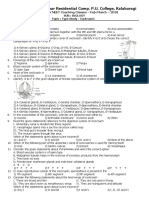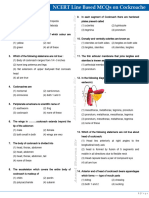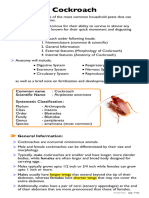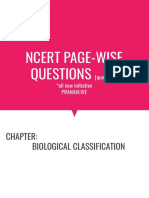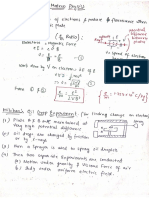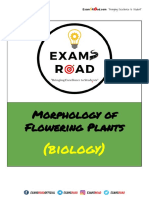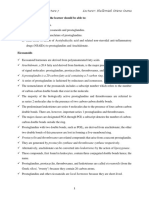0 ratings0% found this document useful (0 votes)
51 viewsCockroach Pagewise
1. Cockroaches belong to the class Insecta of the phylum Arthropoda.
2. Cockroaches are omnivorous, fossorial, monoecious, and coelomate.
3. Cockroaches are serious pests and vectors of several diseases.
4. The body of a cockroach is segmented into a head, thorax, and abdomen.
Uploaded by
Vogolus machatteCopyright
© © All Rights Reserved
Available Formats
Download as PDF, TXT or read online on Scribd
0 ratings0% found this document useful (0 votes)
51 viewsCockroach Pagewise
1. Cockroaches belong to the class Insecta of the phylum Arthropoda.
2. Cockroaches are omnivorous, fossorial, monoecious, and coelomate.
3. Cockroaches are serious pests and vectors of several diseases.
4. The body of a cockroach is segmented into a head, thorax, and abdomen.
Uploaded by
Vogolus machatteCopyright
© © All Rights Reserved
Available Formats
Download as PDF, TXT or read online on Scribd
You are on page 1/ 9
COCKROACH
1. Periplaneta belongs to-
1. Class insecta of phylum arthropoda
2. Class insecta of phylum annelida
3. Class insecta of phylum Mollusca
4. Class insecta of platyhelminthes
2. Which of the following is correct as regard to coackroach
1. Nocturnal, fossorial, monoecious, coelomate
2. Omnivorous, fossorial, dioecious, coelomate
3. Omnivorous, fossorial, monoecious, coelomate
4. Omnivorous, fossorial, monoecious, pseudocoelomate
3. Cockroach is-
1) Not a pest but a vector of several diseases
2) A pest but not a vector of any disease
3) A serious pest and vector of several diseases
4) either a pest nor a vector of diseases
4. the body of cockroach is segmented and divisible into-
1) head and thorax
2) head and abdomen
3) abdomen and thorax
4) head, thorax and abdomen
5. exoskeleton of cockroach is formed by-
1) keratin
2) amino acids
3) chitinous cuticle
4) non chitinous cuticle
6. in cockroach, the body in spite of being covered by an exoskeleton of strong
chitinous cuticle remains flexible due to-
1. tergites
2. sternites
3. pleurites
4. arthrodial membrane or articular membrane
7. in each segment of cockroach, the exoskeleton has hardened pates called
1. sclerites
2. arthrodial membrane
3. ossicles
4. none
8. the dorsal sclerites and ventral sclerites are called
1. sternites and tergites respectively
2. tergites and sternites respectively
3. sternites and pleurites respectively
4. tergites and pleurites respectively
9. The head of cockroach consists of fusion of _____ segments
Join Our Telegram Channel
1. 6
2. 10
3. 14
4. 18
10. In cockroach, head can move in all directions due to
1. Absence of neck
2. Fusion of all 6 segments of head
3. Flexible neck
4. Head is small and light in weight
11. In cockroach, a pair of antennae arises from membranous socket. Antennae are-
1. Without any sensory receptors
2. Many segmented
3. Sensory receptors that help in monitoring the environment
4. B and c are correct
12. Mouth parts of cockroach are
1. Sponging type
2. Biting and sucking type
3. Biting and chewing type
4. Piercing and sucking type
13. Tongue of cockroach is
1. Labrum
2. Mandibles
3. Labium
4. Hypopharynx
14. Mandibles of cockroach are
1. Long and pointed
2. Short without teeth
3. Perforated, syringe like
4. With grinding and incising regions
15. In cockroach mouth part consists of a labum, a pair of mandibles, a pair of maxillae
and labium. Labrum and labium acts as
1. Upper and lower jaws respectively
2. Lower and upper jaws respectively
3. Upper jaw and lips respectively
4. Upper and lower lips respectively
16. The two pair of wings in Periplaneta are situated on-
1. Prothorax and metathorax
2. Prothorax and mesothorax
3. Mesothorax and metathorax
4. Metathorax and first abdominal segment
17. In cockroach, wings are absent in
1. Prothorax
2. Mesothorax
3. Metathorax
4. None of these
18. Forewings of cockroach are articulated to-
1. Prothorax
2. Metathorax
3. Mesothorax
4. First abdominal segment
19. In cockroach, the first pair of wings are known as-
1. Terga
2. Sterna
3. Tegmina
4. Halteres
20. Metathoracic wings in cockroaches are –
1. Halteres
2. Tegmina
3. Hemielytra
4. None of these
21. Which of the following statements are correct about forewings in cockroach?
1. They are mesothoracic
2. They are opaque, dark, leathery, and cover hindwing when at rest
3. They are not used in flight
4. All
22. Which of the following statements are correct about the hindwings in cockroach?
1. They are transparent and membranous
2. They are metathoracic
3. They are used in flight
4. All
23. In cockroach, thorax is divided into how many segments?
1. 3
2. 4
3. 5
4. 6
24. The abdomen in male an female cockroach consists of-
1. 10 segments
2. 8 segments
3. 12 segments
4. 18 segments
25. In female cockroach, 7th sternum is
1. Annular
2. Filamentous
3. Boat shaped
4. Spiral
26. In female cockroach, 7th sternum together with 8th and 9th sterna forms
1. A brood/genital pouch
2. Anal cercus
3. Anal style
4. None
27. Anterior part of genital pouch in female cockroach contains
1. Gonopore
2. Spermathecal pores
3. Collateral glands
4. All
28. Stink glands are found in cockroach
1. 6/7 thoracic segment
2. 6/7 abdominal segment
3. 5/6 abdominal segment
4. 4/5 abdominal segment
29. Which of the following is correct about cockroach?
1. Sexual dimorphism is distinct
2. The anal styles are present on 9th sternite of male only
3. In both sexes the 10th segment bears a pair of jointed filamentous structure
4. All
30. Male cockroach has
1. Dorsal anus, ventral genital pore and gonapophysis
2. Ventral anus, dorsal genital pore and gonapophysis
3. Dorsal anus, ventral genital pore but no gonapophysis
4. Dorsal anus, ventral genital pore, gonapophysis but no anal styles
31. The largest part of alimentary canal of cockroach is-
1. Crop
2. Rectum
3. Gizzard
4. Ileum
32. Which part of alimentary canal of cockroach contributes to crushing food?
1. Crop
2. Rectum
3. Gizzard
4. Ileum
33. The gizzard or proventriculus has an outer layer of thick muscles and thick inner
cuticle forming _______ chitinous plates called teeth
1. 3
2. 6
3. 9
4. 12
34. A ring 6-8 blind tubules called hepatic/gastric caecae are present at-
1. Fore gut
2. Hindgut
3. Midgut
4. Junction of foregut
35. The hepatic caecae in cockroach-
1. Store excess food
2. Produce digestive enzymes
3. Absorb fully digested food
4. Are helpful in egestion
36. Which of the following is correct about alimentary canal of cockroach
1. The entire foregut is line by cuticle
2. Hindgut is broader than midgut
3. Hindgut is differentiated into ileum, colon and rectum
4. All
37. Open blood vascular system without haemoglobin is found in-
1. Earthworm
2. Frog
3. Rat
4. Cockroach
38. The position of heart in cockroach is-
1. Lateral
2. Dorsal
3. Ventral
4. Mid-dorsal line of thorax and abdomen
39. Which of the following character of cockroach?
1. Reduced wing
2. Cocoon formation
3. 13-chambered heart
4. Absence of salivary gland
40. Heart of cockroach is
1. Membranous
2. Muscular tube like
3. Absent
4. Filled with blood having RBC
41. Which of the following is false about heart of cockroach?
1. It is differentiated into funnel shaped chambers with ostia on either side
2. It is myogenic
3. Blood from sinuses enter the heart through ostia and and is pumped anteriorly to
sinuses again
4. Alary muscles are related to heart
42. The principal function of blood vascular system in cockroach is-
1. Transport of heart
2. Transport of oxygen
3. Transport of enzyme
4. Distribution of digested food + transport of products
43. Which of the following is correct
1. In cockroach, blood vessels are poorly developed and open into haemocoel
2. In cockroach, visceral organs located in haemocoel are bathed in blood
( haemolymph)
3. The haemolymph consists of colourless plasma and haemocytes
4. All
44. The respiratory system in body of cockroach consists of-
1. Bronchi
2. Bronchioles
3. Network of trachea
4. Haemocyanin
45. Number of spiracles in cockroach are-
1. 2 pairs on thorax and 8 pairs on abdomen
2. 3 pairs on thorax and 7 pairs on abdomen
3. 3 pairs on thorax and 9 pairs on abdomen
4. 1 pair on thorax and 6 pairs on abdomen
46. Spiracles in cockroach are small holes present which side of body
1. Dorsal
2. Ventral
3. Lateral
4. Mid-dorsal
47. The blood of cockroach contains no respiratory pigment, it means that-
1. Respiration is anaerobic
2. Cockroach has no respiration
3. Oxygen goes into tissue with H2O from outside
4. Oxygen goes directly into tissue through tracheal system
48. Which of the following is false regarding the respiratory system of cockroach
1. Opening of spiracles is regulated by sphincters
2. Exchange of gases takes place at tracheoles by diffusion
3. Oxygen carrying respiratory pigment is haemoerythrin
4. Trachea has no non-collapsible wall
49. The excretory organ in cockroach are-
1. Green glands
2. Hepatic caecae
3. Malphigian tubules
4. Malphigian corpuscles
50. Cockroach is
1. Uricotelic
2. Ureotelic
3. Ammonotelic
4. Guanotelic
51. Malphigian tubules remove excretory products from-
1. Haemolymph
2. Gut
3. Both a and b
4. Kidney
52. Malphigian tubules open at junction of
1. Gizzard and midgut
2. Midgut and ileum
3. Ileum and colon
4. Colon and rectum
53. The visual unit of cockroach are-
1. Ocelli
2. Ctenidia
3. Ommatidia
4. Rhabdoma
54. In male cockroach, a pair of testis are located one of each lateral side in the
abdominal segment
1. 6-10th
2. 6th-8th
3. 4th-6th
4. 10th-12th
55. The ovaries of cockroach are located in the abdominal segments
1. 2-6
2. 5-6
3. 1-2
4. 5-8
56. Each ovary of cockroach consists of how many ovarian tubules/ovarioles
1. 6
2. 8
3. 10
4. 12
57. Collateral glands are present in-
1. Male cockroach
2. Female cockroach
3. In both
4. Absent in cockroach
You might also like
- The Role of Hormones in The Female and MALE REPRODUCTIVE SYSTEM100% (5)The Role of Hormones in The Female and MALE REPRODUCTIVE SYSTEM10 pages
- (2022-24) TWT - Structural organisation in animals (Cockroach) - Prof - SCZ FINALNo ratings yet(2022-24) TWT - Structural organisation in animals (Cockroach) - Prof - SCZ FINAL10 pages
- (2021-23) TWT - COCKROACH - Prof - SCZ FINAL (1)No ratings yet(2021-23) TWT - COCKROACH - Prof - SCZ FINAL (1)8 pages
- NEET UG Biology Cockroach Comparative StudyNo ratings yetNEET UG Biology Cockroach Comparative Study8 pages
- Structural Organisation in Animals (04!03!2022)No ratings yetStructural Organisation in Animals (04!03!2022)12 pages
- Structural Organisation in Animals SNS 01 (Topic Wise Test 02) - 2290 - 1704438531425No ratings yetStructural Organisation in Animals SNS 01 (Topic Wise Test 02) - 2290 - 17044385314254 pages
- Day 19 Cockroach and Frog 250104 103636No ratings yetDay 19 Cockroach and Frog 250104 10363660 pages
- Chapter 07 Structural Organisation in Animals ANo ratings yetChapter 07 Structural Organisation in Animals A6 pages
- Text Book Back Questions and Answers: Organ and Organ Systems in AnimalsNo ratings yetText Book Back Questions and Answers: Organ and Organ Systems in Animals46 pages
- Revision and Practice Session On Earthworm and Cockroach NEET 2024 With AnnoNo ratings yetRevision and Practice Session On Earthworm and Cockroach NEET 2024 With Anno106 pages
- 67206fec8eb6caea4ca9fb69_##_Diwali Assignment_Structural Organization in animals, Frog & Cockroach, Biomolecules, Breathin & Exchange of Gases Zoology_NEET_Arpana Mam_Vikash KumarNo ratings yet67206fec8eb6caea4ca9fb69_##_Diwali Assignment_Structural Organization in animals, Frog & Cockroach, Biomolecules, Breathin & Exchange of Gases Zoology_NEET_Arpana Mam_Vikash Kumar8 pages
- Class_XI_M 3 Handout XI Bio Ch 7 STRUCTURAL ORGANISATION IN ANIMALS CockroachNo ratings yetClass_XI_M 3 Handout XI Bio Ch 7 STRUCTURAL ORGANISATION IN ANIMALS Cockroach3 pages
- Structural Organization in Animals Part 2 (Cockroach and Frog) - DPP 02 - Extra - Yakeen 2.0 2024 (Legend)No ratings yetStructural Organization in Animals Part 2 (Cockroach and Frog) - DPP 02 - Extra - Yakeen 2.0 2024 (Legend)3 pages
- To Study The External Features and Digestive System of Cockroaches100% (1)To Study The External Features and Digestive System of Cockroaches28 pages
- Anatomy and Physiology: The Lymphatic System: Things You Should Know (Questions and Answers)From EverandAnatomy and Physiology: The Lymphatic System: Things You Should Know (Questions and Answers)No ratings yet
- Anatomy and Physiology: The Reproductive System: Things You Should Know (Questions and Answers)From EverandAnatomy and Physiology: The Reproductive System: Things You Should Know (Questions and Answers)No ratings yet
- Ncert Page Wise Q Biological ClassificationNo ratings yetNcert Page Wise Q Biological Classification22 pages
- Notes On Morphology of Flowering PlantsNo ratings yetNotes On Morphology of Flowering Plants10 pages
- Notes On Molecular Basis of Inheritance by ExamsRoadNo ratings yetNotes On Molecular Basis of Inheritance by ExamsRoad8 pages
- Lab Exercise 2 The Physiology of Skeletal Muscle: SafetyNo ratings yetLab Exercise 2 The Physiology of Skeletal Muscle: Safety11 pages
- A. Body Fluids and Electrolytes by D SiwaleNo ratings yetA. Body Fluids and Electrolytes by D Siwale40 pages
- Instant Ebooks Textbook Guide To Research Techniques in Neuroscience 3nd Edition Matt Carter - Ebook PDF Download All Chapters100% (5)Instant Ebooks Textbook Guide To Research Techniques in Neuroscience 3nd Edition Matt Carter - Ebook PDF Download All Chapters41 pages
- Morphological Basis of Resistance in Plants To InsectsNo ratings yetMorphological Basis of Resistance in Plants To Insects12 pages
- Physical Exercise and Epigenetic Modifications in Skeletal MuscleNo ratings yetPhysical Exercise and Epigenetic Modifications in Skeletal Muscle15 pages
- Bioknowledgy Quick Quiz On Membrane Transport (1.4) : (19 Marks)No ratings yetBioknowledgy Quick Quiz On Membrane Transport (1.4) : (19 Marks)3 pages
- EXERCISE NO.3 Animal Cell and Plant Cell 1 1No ratings yetEXERCISE NO.3 Animal Cell and Plant Cell 1 13 pages
- Structural Organisation in Animals: Morphology and Anatomy of CockroachNo ratings yetStructural Organisation in Animals: Morphology and Anatomy of Cockroach13 pages
- Bermudez, Zatorre - 2009 - The Absolute Pitch Mind Continues To Reveal ItselfNo ratings yetBermudez, Zatorre - 2009 - The Absolute Pitch Mind Continues To Reveal Itself4 pages
- Instant download Percutaneous Collagen Induction With Microneedling: A Step-by-Step Clinical Guide Emerson Lima pdf all chapter100% (4)Instant download Percutaneous Collagen Induction With Microneedling: A Step-by-Step Clinical Guide Emerson Lima pdf all chapter55 pages


